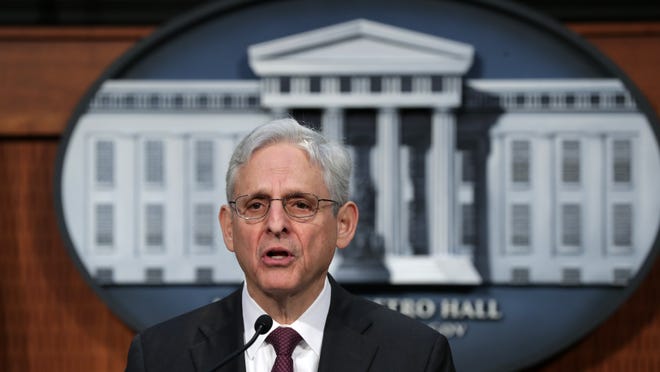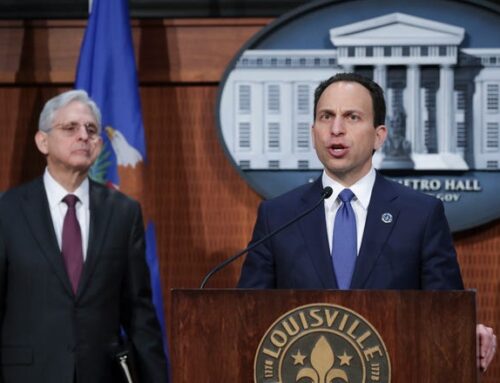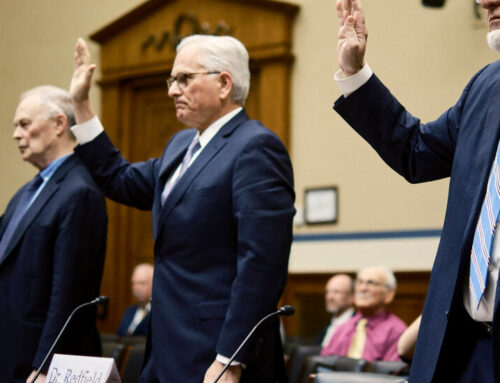This post was originally published on this site
https://www.gannett-cdn.com/presto/2023/03/08/PLOU/1ee87b3f-c65c-4e19-9681-aa472ba43085-DOJ_03_Sam.jpgThe U.S. Department of Justice announced Wednesday morning the results of its nearly two-year “pattern or practice” investigation into excessive force and discriminatory policing violations by Louisville Metro Police.
U.S. Attorney General Merrick Garland came to Louisville to discuss the investigation’s findings, which started just over a year after the 2020 police killing of Breonna Taylor.
One key takeaway is that Louisville Metro and the city’s police department agreed in principle to negotiate a consent decree with the Department of Justice.
What is a federal consent decree?
A consent decree is a legal negotiation between the Department of Justice and the police department of the city in which it’s being instituted. It’s a federal court-approved settlement noting steps that will be taken by the department to improve, with a monitor who will report progress to the court.
Associate Attorney General Vanita Gupta said it would be “a court-enforceable consent decree to ensure sustainable, constitutional and effective public safety and emergency response services in Louisville.”
Related:What they said: Notable quotes on Louisville police investigation
Who decides what’s in the consent decree?
Gupta said the agreement in principle between Louisville Metro, LMPD and the Department of Justice is just a framework that will be used to negotiate the final consent decree.
In Louisville’s case, Gupta said the Department of Justice will meet with members of the community and law enforcement officials to ask what they want to see from LMPD. Participation from the community and law enforcement should be continuous to enact “real and lasting change in Louisville.”
The consent decree, she said, is a commitment to “ensure sustainable, constitutional and effective public safety and emergency response services in Louisville.”
How long will the consent decree last?
There is no set time for how long a consent decree lasts. A department will only be released from a consent decree if it meets its goals and the court finds it in compliance.
What is an example of a consent decree?
A consent decree between the City of Seattle and the Department of Justice requiring Seattle to implement police reforms “with the goal of ensuring that police services are delivered to the people of Seattle in a manner that full complies with the Constitution and laws of the United States, effectively ensures public trust and officer safety, and promotes public confidence…” was entered into in 2012. That decree is being overseen by a district court judge and is still ongoing.
Who’s makes sure the consent decree is implemented?
An independent monitor will be appointed to oversee the consent decree. Garland said in Louisville’s case, the person will be an “expert in this field” and will be approved by the judge in charge of the consent decree. Gupta added that they are committed to “selecting a third-party independent monitor who will assist the court and parties in determining whether the consent decree is being implemented.”
More:DOJ’s report into Louisville police: How people are responding on social media
More:Read full US Department of Justice report on Louisville police violations and recommended reform
What’s the history of consent decrees?
Consent decrees were enacted in a 1994 law after Rodney King was beaten by officers with Los Angeles Police. With it, a U.S. attorney general can order an investigation on whether a police department has exhibited “pattern or practice” of misconduct, such as using excessive force or discriminatory stops or arrests.
Consent decrees have been used in other cities, like Baltimore, Cleveland and New Orleans and have proven effective. In the New Orleans, residents’ approval rating of the police department grew from 33% in 2009 to 57% in 2020.
Gupta said the city did not wait until the results of the investigation to enact changes, including a $12 million settlement with Taylor’s family. She said, “The agreement in principle only represents a framework and in the coming months we will use the framework to negotiate a comprehensive consent decree with the city that will be filed in federal court.”
Reach Ana Rocío Álvarez Bríñez at [email protected]; follow her on Twitter at @SoyAnaAlvarez



